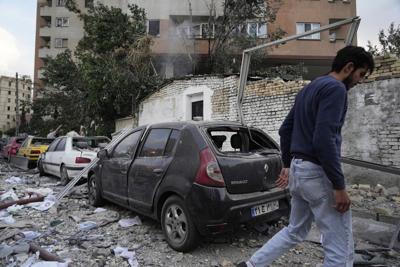CALGARY - It's too soon to know whether a spike in crude prices driven by the latest Mideast turmoil will be a short-term blip or a long-term shift, ´şÉ«Ö±˛Ą oilpatch experts said Friday after Israel attacked nuclear and military sites across Iran.Â
"I would see this as a bit of a knee-jerk reaction," said Enverus commodities expert Al Salazar.
"Over time, should there be no impact on supply or energy infrastructure, price spikes like this fade as it really doesn't impact the supply and demand balance."
The July contract for West Texas Intermediate crude settled at US$72.98 per barrel, a more than seven per cent increase over Thursday.Â
The price of fuel at the pump tends to move in tandem with the raw product used to make it, crude oil.Â
"You might get a little bit of a pop here, but I suspect it would be minimal unless it's truly sustained for a long period," Salazar said.Â
Fuel price-tracking website says the national average price of unleaded gasoline in Canada is 136.1 cents a litre, up a penny day over day.
"I would expect that over the next couple of days, we probably will see prices rising, maybe five to 10 cents a litre," Patrick De Haan, head of petroleum analysis at .
Diesel prices could see a bigger jolt, as inventories are almost 20 per cent below the five-year average for this time of year, De Haan added. That would be bad news for truckers and farmers.Â
"This situation could be short or it could be very lengthy for the course of the summer," De Haan said. "So a lot remains to be seen as this is a very fresh situation and it's unfolding in front of us."Â
The energy subindex on the S&P/TSX composite index was up 2.8 per cent on a day that the overall ´şÉ«Ö±˛Ą market lost more than 100 points.Â
Friday's attack appeared to be the most significant Iran has faced since it's 1980s war with Iraq.Â
Israeli leaders cast it as a necessary move to head off an imminent nuclear threat. Iran quickly retaliated by sending missiles into Israel.Â
A wide range of price scenarios could result from the ratcheting up in Mideast hostilities, said Jackie Forrest, managing director of energy research at Arc Financial Corp.Â
"I don't think anyone's making any decisions, probably just trying to understand a bit more what the likelihood of each of these scenarios is," she said.Â
Prices could settle back to normal in short order if the conflict is resolved quickly, she said. Or, in an extreme and unlikely case, the Strait of Hormuz gets cut off and crude price soar north of US$100 per barrel.Â
The strait is a crucial oil transit point connecting the Persian Gulf and the Gulf of Oman, through which up to 20 per cent of the globe's oil supply moves every day.Â
A more likely outcome, Forrest said, would be if there were some disruption to Iran's ability to export its own crude — a loss of up to 1.8 million barrels a day to the global market.
"I think that prices probably stay more moderate in that scenario because the (Organization of the Petroleum Exporting Countries) group has about six million barrels a day of spare capacity right now, and so they are able to offset the loss of Iranian supply if that were to occur," she said.Â
Iran was the ninth largest oil producer in the world as of 2023, according to the U.S. Energy Information Administration.
Canada was in the fourth spot.Â
Salazar and Forrest agreed the Israel-Iran conflict may highlight the role Canada could play as a stable global supplier of crude.Â
"But our issue is we don't have very many barrels that hit the international market. The vast majority of our crude oil goes to the United States," said Forrest.Â
"If we had more pipelines to tidewater and had higher production, then people would be interested in our supply, because so much of the world's oil supply comes through some of these choke points and creates energy security and supply security issues."
— With files from The Associated Press
This report by ´şÉ«Ö±˛Ąwas first published June 13, 2025.








































